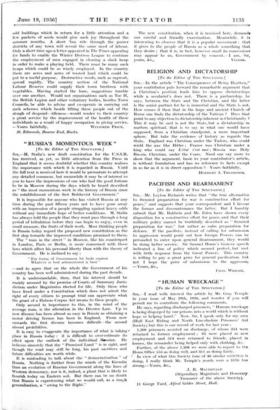" RUSSIA'S MOMENTOUS WEEK " [To the Editor of THE
SPECTATOR.) SIR,—M. Stalin's new draft constitution for the U.S.S.R. has received, as yet, so little attention from the Press in England that it seems doubtful whether this country realises the importance with which it is regarded in Russia. Until the full text is received here it would be premature to attempt any detailed comment, but meanwhile it may be of interest to you to have the impressions of one who had the good fortune to be in Moscow during the days which he heard described as " the most momentous week in the history of Russia since the establishment of the first Bolshevist Government."
It is impossible for anyone who has visited Russia at any time during the past fifteen years not to have gone away with an impression of a people struggling against heavy odds without any immediate hope of better conditions. M. Stalin has always told the people that they must pass through a long period of tribulation before they can begin to enjoy, even in small measure, the fruits of their work. Most thinking people in Russia today regard the proposed new constitution as the first step towards the improved conditions promised to them.
The " man in the street " in Moscow, like his counterpart in London, Paris or Berlin, is more concerned with those laws which affect his personal liberty than with the theory of Government. He is inclined to say : " For forms of Government let fools contest Whate'er is best administered is best " —and to agree that on the whole the Government of his country has been well administered during the past decade.
It is understandable, then, that his interest should be mainly aroused by the promise of Courts of Summary Juris- diction. under Magistrates elected for life. Only those who have lived under a Constitution which does not admit the right of every citizen to prompt trial can appreciate what the grant of a Habeas Corpus Act means to these people.
Only second in importance to this, in the mind of the average man, is the alteration in the Divorce Law. Up to now divorce has been almosi as easy in Russia as obtaining a motor driving licence has been in England. From now onwards the first divorce becomes difficult—the second almost prohibitive. It is,easy to exaggerate the importance of what is taking place in Russia today : it is difficult to oeer-estimate its effect upon the outlook of the individual Russian. He believes sincerely that the " Promised Land " is in sight, and though the road may still be long, his past sacrifices and future difficulties are worth while.
It is misleading to talk about the " democratisation " of Russia. Nothing is further from the minds of the Kremlin than an evolution of Russian Government along the lines of Western democracy, nor is it, indeed, a plant that is likely to flourish today on Eastern soil. But there can be no doubt that Russia is experiencing what we would call, as a rough generalisation, a "swing to the Right." The new constitution, when it is received here, demands our careful and friendly examination. Meanwhile, it is interesting to observe that it is a popular movement : that it gives to the people of Russia as a whole something that they desire ; that it is, in fact, however small its concessions may appear to us, Government by consent.—I am, Sir,










































 Previous page
Previous page